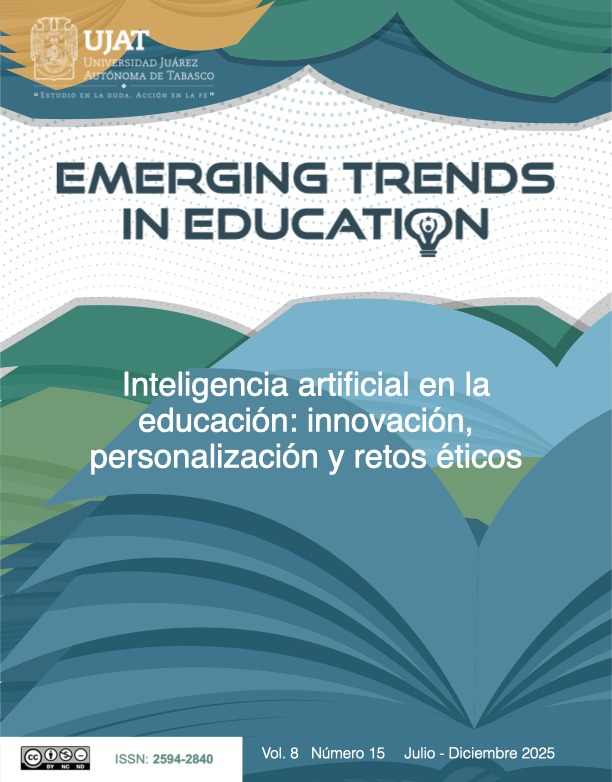Relationships Between Self-Control and Forgiveness with Defensive Interventions by Bystanders in Cyberbullying
DOI:
https://doi.org/10.19136/etie.v8n15.6318Keywords:
cyberbullying, cyberbystanders, forgiveness, human strengths, self-controlAbstract
Some studies have indicated that self-control and forgiveness contribute to the reduction of cyberbullying (Oliveira et al., 2024; Peker & Yildiz, 2021; Wang & Ge, 2021); however, few studies have investigated the relationships between the variables of self-control and forgiveness with the defensive interventions of bystanders in cyberbullying. This study aims to examine the correlation between the human strengths of forgiveness and self-control and the defensive interventions in bystanders in cyberbullying. The sample was selected in a non-probabilistic way with intentional sampling, with 147 university students aged 17 to 35 years (M age = 22.50, SD = 3.78). Two scales of the multidimensional temperance scale in adolescents were used to measure forgiveness and self-control (García-Vázquez et al., 2021). Bystanders’ defensive interventions were measured using the aggressive and constructive intervention subscales from the Bystander Intervention Style Scale (Alcantar-Nieblas et al., 2022). Bystander defensive interventions were measured using the Aggressive and Constructive Intervention subscales of the Bystander Intervention Styles Instrument scale (Alcantar-Nieblas et al., 2022). This scale presents two dimensions: (a) Constructive Intervention and (b) Aggressive Intervention. A correlation test (p < .05) revealed that self-control and forgiveness were positively and significantly associated with constructive interventions. However, no relationship was found between these strengths and aggressive interventions.
References
Adorjan, M., & Ricciardelli, R. (2019). Student perspectives towards school responses to cyber-risk and safety: the presumption of the prudent digital citizen. Learning, Media and Technology, 44(4), 430–442. https://doi.org/10.1080/17439884.2019.1583671
Alcantar-Nieblas, C., Álvarez-Montero, F. J., & Valdés-Cuervo, Á. A. (2022). Relación entre la identidad moral y los estilos de intervención de los espectadores defensores en el ciberacoso. RECIE. Revista Electrónica Científica de Investigación Educativa, 6, e1685–e1685. https://doi.org/10.33010/recie.v6i0.1685
Alcantar-Nieblas, C., Valdés-Cuervo, A. A., Parra-Pérez, L. G., Álvarez-Montero, F. J., & García-Vázquez, F. I. (2024). Psychometric properties of the styles of bystander defender intervention scale in cyberbullying in mexican adolescents: Its relationships with moral identity and cyberbullying: Bystander defender intervention scale in cyberbullying. Revista Colombiana de Psicología, 33(1). https://doi.org/10.15446/rcp.v33n1.105145
Allison, K. R., & Bussey, K. (2016). Cyber-bystanding in context: A review of the literature on witnesses' responses to cyberbullying. Children and Youth Services Review, 65, 183–194. https://doi.org/10.1016/j.childyouth.2016.03.026
Brody, N. (2021). Bystander intervention in cyberbullying and online harassment: The role of expectancy violations. International Journal of Communication, 15, 647–667. https://ijoc.org/index.php/ijoc/article/viewFile/14169/3342
Bussey, K., Luo, A., Fitzpatrick, S., & Allison, K. (2020). Defending victims of cyberbullying: The role of self-efficacy and moral disengagement. Journal of School Psychology, 78, 1–12. https://doi.org/10.1016/j.jsp.2019.11.006
Cabrera-Gómez, C. C., Rengifo-Rengifo, L., Suárez, J. M., Rivera-Porras, D., & Carrillo-Sierra, S. M. (2020). Fortalezas de carácter según género en personas de salinas de Guardias: perspectiva de intervención desde el Modelo PERMA a la economía solidaria. Archivos Venezolanos de Farmacología y Terapéutica, 39(2), 226–236. https://doi.org/10.5281/zenodo.4068612
Cárdenas, H. S., García, F. I., & Valdés, Á. A. (2021). Liderazgo, autocontrol y el espectador prosocial en el acoso escolar. En M. A. Zavala, M. A. Vázquez, M. F. Durón, & L. V. Cota (Eds.), Temas selectos de psicología y educación. Evidencia empírica de investigaciones en Sonora, 115–129. Qartuppi. https://doi.org/10.29410/QTP.21.09
Casullo, M. M. (2005). La capacidad para perdonar desde una perspectiva psicológica. Revista de Psicología de la PUCP, 23(1), 39–63. https://www.redalyc.org/pdf/3378/337829529002.pdf
Cho, S. (2018). The impact of low self-control and delinquent peer associations on bullying perpetration and victimization among South Korean adolescents: Time-concurrent, time-lagged, and latent growth curve modeling. Journal of school Violence, 17(4), 500–520. https://doi.org/10.1080/15388220.2018.1453821
Cho, S., Glassner, S., & Lee, J. M. (2019). Impact of low self-control, parental involvement, and peer relationships on changes of bullying perpetration over time: A latent growth curve model of a sample of South Korean adolescents. Children and Youth Services Review, 104, 104397. https://doi.org/10.1016/j.childyouth.2019.104397
Cortés, A., Torres, A., López-López, W., Pérez, D. C., & Pineda-Marín, C. (2016). Comprensiones sobre el perdón y la reconciliación en el contexto del conflicto armado colombiano. Psychosocial Intervention, 25(1), 19–25. https://dx.doi.org/10.1016/j.psi.2015.09.004
Dordron de Pinho, V., & Oliveira, E. M. (2015). Intervenciones para la promoción del perdón y la inserción de la empatía: Revisión de la literatura. Revista Argentina de Clínica Psicológica, 24(2), 111–120. https://www.redalyc.org/pdf/2819/281946783003.pdf
Duckworth, A., & Gross, J. J. (2014). Self-control and grit. Current Directions in Psychological Science, 23(5), 319–325. https://doi.org/10.1177/0963721414541462
Enright, R., & Fitzgibbons, R. (2015). Forgiveness therapy: An empirical guide for resolving anger and restoring hope. American Psychological Association. https://doi.org/10.1037/14526-000
Escobar, J., Montoya, L. E., Restrepo, D., & Mejía, D. (2017). Ciberacoso y comportamiento suicida. ¿Cuál es la conexión? A propósito de un caso. Revista Colombiana de Psiquiatría, 46(4), 247–251 http://dx.doi.org/10.1016/j.rcp.2016.08.004
Estévez, C., Carrillo, A., & Gómez, M. (2018). Inteligencia emocional y bullying en escolares de primaria. International Journal of Developmental and Educational Psychology, 1(1), 227–238. https://www.redalyc.org/journal/3498/349855553025/html/
Ettekal, I., Kochenderfer-Ladd, B., & Ladd, G. W. (2015). A synthesis of person- and relational-level factors that influence bullying and bystanding behaviors: Toward an integrative framework. Aggression and Violent Behavior, 23, 75–86. https://www.sciencedirect.com/science/article/abs/pii/S1359178915000737
Fimbres-Celaya, D., García-Vázquez, F. I., Valdés-Cuervo, A. A., & León-Parada, M. D. (2021). Autocontrol y agresión reactiva en adolescentes mexicanos. European Journal of Child Development, Education and Psychopathology, 9(1), 1–11. https://doi.org/10.32457/ejpad.v9i1.1406
Gander, F., Wagner, L., & Niemiec, R. M. (2024). Do character strengths-based interventions change character strengths? Two randomized controlled intervention studies. Collabra: Psychology, 10(1). https://doi.org/10.1525/collabra.108604
García-Vázquez, F. I., Durón-Ramos, M. F., Pérez-Rios, R., & Pérez-Ibarra, R. E. (2022). Relationships between spirituality, happiness, and prosocial bystander behavior in bullying—The mediating role of altruism. European journal of investigation in health, psychology and education, 12(12), 1833–1841. https://doi.org/10.3390/ejihpe12120128
García-Vázquez, F. I., Valdés-Cuervo, A. A., & Parra-Pérez, L. G. (2020a). The effects of forgiveness, gratitude, and self-control on reactive and proactive aggression in bullying. International Journal of Environmental Research and Public Health, 17(16), Article e5760. https://doi.org/10.3390/ijerph17165760
García-Vázquez, F. I., Valdés-Cuervo, A. A., León-Parada, M. D. & Parra-Pérez, L. G. (2024). Restorative parental discipline and types of defending bystander intervention in cyberbullying: the mediate role of justice sensitivity. Cyberpsychology, Behavior, and Social Networking, 0(0) 1–10 https://doi.org/10.1089/cyber.2023.0445
García-Vázquez, F. I., Valdés-Cuervo, A. A., Martínez-Ferrer, B., & Parra-Pérez, L. G. (2019). Forgiveness, gratitude, happiness, and prosocial bystander behavior in bullying. Frontiers in Psychology, 10, Article 2827. https://doi.org/10.3389/fpsyg.2019.02827
García-Vázquez, F. I., Valdés-Cuervo, A. A., Martínez-Ferrer, B., & Parra-Pérez, L. G. (2020b). Forgiveness, gratitude, happiness, and prosocial bystander behavior in bullying. Frontiers in Psychology, 10, 1–12 https://doi.org/10.3389/fpsyg.2019.02827
García-Vázquez, F. I., Valdés-Cuervo, Á. A., Navarro-Villarreal, A. G., Parra-Pérez, L. G., Durón-Ramos, M. F., & Fimbres-Celaya, D. (2021). Psychometric properties of the multidimensional temperance scale in adolescents. International Journal of Environmental Research and Public Health, 18(23), 12727. https://doi.org/10.3390/ijerph182312727
Herrera-López, M., Romera, E. M., & Ortega-Ruíz, R. (2018). Bullying y Cyberbullying en Latinoamérica. Un estudio bibliométrico. Revista mexicana de investigación educativa, 23(76), 125–155. http://www.scielo.org.mx/scielo.php?script=sci_arttext&pid=S1405-66662018000100125&lng=es&tlng=es.Investigaci%C3%B3n%20cuantitativa%20y%20cualitativa.pdf
Instituto Nacional de Estadística y Geografía. (2023). Módulo sobre ciberacoso (MOCIBA) 2022. https://www.inegi.org.mx/programas/mociba/2022/
Instituto Nacional de Estadística y Geografía. (2024). Módulo sobre ciberacoso (MOCIBA) 2023. Cortéshttps://www.inegi.org.mx/programas/mociba/2023/
Leung, A. N. M. (2021). To help or not to help: Intervening in cyberbullying among Chinese cyber-bystanders. Frontiers in Psychology, 12(1), 1–13. https://doi.org/10.3389/fpsyg.2021.483250
Leung, A. N., Wong, N., & Farver, J. M. (2018). You are what you read: The belief systems of cyber-bystanders on social networking site. Frontiers in psychology, 9, 365. https://doi.org/10.3389/fpsyg.2018.00365
Luo, A., & Bussey, K. (2019). The selectivity of moral disengagement in defenders of cyberbullying: Contextual moral disengagement. Computers in Human Behavior, 93, 318–325. https://doi.org/10.1016/j.chb.2018.12.038
Machackova, H., Pfetsch, J., & Steffgen, G. (2018). Editorial: Special issue on bystanders of online aggression. Cyberpsychology: Journal of Psychosocial Research on Cyberspace, 12(4), 1. https://doi.org/10.5817/CP2018-4-xx
Marín-Cortés, A., & Linne, J. (2020). Una revisión sobre emociones asociadas al ciberacoso en jóvenes adultos. Psicoperspectivas, 19(3), 155–170. https://dx.doi.org/10.5027/psicoperspectivas-vol19-issue3-fulltext-1824
Millán, E., & Caro, C. (2022). Prevención de la violencia y el acoso en la red en adolescentes: estrategias familiares de crecimiento personal. Teoría de la Educación, Revista Interuniversitaria, 34(1), 105–124. https://doi.org/10.14201/teri.26157
Millán-Ghisleri, E., & Ahedo-Ruiz, J. (2023). Perspectiva antropológica del perdón desde Hannah Arendt y Leonardo Polo. Sophia. Colección de Filosofía de la Educación, (34), 65–86. https://doi.org/10.17163/soph.n34.2023.02
Moretti, C., & Herkovits, D. (2021). De víctimas, perpetradores y espectadores: una meta-etnografía de los roles en el ciberbullying. Cadernos de Saúde Pública, 37(4), e00097120. https://doi.org/10.1590/0102-311X00097120
Moxey, N., & Bussey, K. (2020). Styles of bystander intervention in cyberbullying incidents. International Journal of Bullying Prevention, 2, 6–15. https://doi.org/10.1007/s42380-019-00039-1
Neill, D., & Cortez, L. (2018). Investigación cuantitativa y cualitativa. Neill, D. A., Quezada-Abad, C., & Arce-Rodríguez, J. Procesos y Fundamentos de la Investigación Científica. Editorial UTMACH, 1(4), 68–87 http://repositorio.utmachala.edu.ec/bitstream/48000/14232/1/Cap.4-Investigaci%c3%b3n%20cuantitativa%20y%20cualitativa.pdf
Oliveira, W. A. D., Esteca, A. M. N., Wechsler, S. M., & Menesini, E. (2024). Bullying and cyberbullying in school: rapid review on the roles of gratitude, forgiveness, and self-regulation. International journal of environmental research and public health, 21(7), 839. https://doi.org/10.3390/ijerph21070839
Olweus, D. (2012). Cyberbullying: an overrated phenomenon?, European Journal of Developmental Psychology, 9(5), 520–538. https://doi.org/10.1080/17405629.2012.682358
Olweus, D., & Limber, S. P. (2018). Some problems with cyberbullying research. Current Opinion in Psychology, 19, 139–143. https://doi.org/10.1016/j.copsyc.2017.04.012
Pechorro, P., Marsee, M., DeLisi, M., & Maroco, J. (2021). Self-control and aggression versatility: moderating effects in the prediction of delinquency and conduct disorder among youth. The Journal of Forensic Psychiatry & Psychology, 32(6), 949–966. https://doi.org/10.1080/14789949.2021.1959627
Peker, A., & Yildiz, M. N. (2021). Mediating Role of self-control in the relationship between aggressiveness and cyber bullying. Psychiatry and Behavioral Sciences, 11(1), 40. https://doi.org/10.5455/PBS.20210114051215
Pronk, J., Olthof, T., Goossens, F. A., & Krabbendam, L. (2019). Differences in adolescents’ motivations for indirect, direct, and hybrid peer defending. Social Development, 28(2), 414–429. https://doi.org/10.1111/sode.12348
Quintana-Orts, C. L., & Rey, L. (2020). El perdón ante el acoso y el ciberacoso escolar. ¿Por qué es tan importante entrenarlo en la adolescencia? El perdón ante el acoso y ciberacoso escolar. Centro de Estudios Andaluces, 91, 1–18. https://www.centrodeestudiosandaluces.es/publicaciones/n-91-el-perdon-ante-el-acoso-y-el-ciberacoso-escolar-por-que-es-tan-importante-entrenarlo-en-la-adolescencia
Quintana-Orts, C. L., Rey, L., & Worthington, E. L. J. (2021). Una revisión narrativa de los instrumentos usados para evaluar el perdón en contextos de acoso y ciberacoso escolar. Know and Share Psychology, 2(1). https://doi.org/10.25115/kasp.v2i1.3894
Rapp, H., Wang Xu, J., & Enright, R. D. (2022). A meta‐analysis of forgiveness education interventions’ effects on forgiveness and anger in children and adolescents. Child Development, 93(5), 1249–1269. https://doi.org/10.1111/cdev.13771
Real, M., Navarro-Soria, I., Collado-Valero, J., Lavigne-Cervan, R., & Delgado-Domenech, B. (2022). Ciberacoso y funciones ejecutivas en niños y adolescentes: una revisión sistemática. Revista de Educación, 397, 69–95. https://doi.org/10.4438/1988-592X-RE-2022-397-540
Rocha, A., Amarís, M., & López López, W. (2017). El perdón como estrategia de afrontamiento. Una mirada desde el modelo de la complejidad del afrontamiento. Terapia Psicológica, 35(3), 271–281. http://dx.doi.org/10.4067/S0718-48082017000300271
Russell, L. (2020). The who, the what, and the how of forgiveness. Philosophy Compass, 15(3), e12656. https://doi.org/10.1111/phc3.12656
Seligman, M. E. P. (2011). Flourish. A visionary new understanding of happiness and well being. Free Press.
Serrano, F. J., & Cázares, M. D. (2019). ¿Qué y por qué perdonar? Una revisión deflacionaria de la moralidad del perdón. En claves del Pensamiento, 13(25), 83–103. https://www.redalyc.org/journal/1411/141160244004/141160244004.pdf
Tirrell, J. M. (2022). Forgiveness as a character strength: Toward a developmental model and research agenda. Journal of Moral Education, 51(3), 312–335. https://doi.org/10.1080/03057240.2021.1873754
Valdés-Cuervo, A. A., Alcántar-Nieblas, C., Parra-Pérez, L. G., Torres-Acuña, G. M., Álvarez-Montero, F. J., & Reyes-Sosa, H. (2021). Unique and interactive effects of guilt and sympathy on bystander aggressive defender intervention in cyberbullying: The mediation of self-regulation. Computers in Human Behavior, 122, Article e106842. https://doi.org/10.1016/j.chb.2021.106842
Wang, L., & Ge, T. (2021). Does victimization predict cyberbullying perpetration? Examining depression as a mediator and self-control as a moderator. Personality and individual differences, 183, 111135. https://doi.org/10.1016/j.paid.2021.111135
Wong, R. Y. M., Cheung, C. M., Xiao, B., & Thatcher, J. B. (2021). Standing up or standing by: Understanding bystanders’ proactive reporting responses to social media harassment. Information Systems Research, 32(2), 561–581. https://doi.org/10.1287/isre.2020.0983
Yot-Domínguez, C., Guzmán Franco, M. D., & Duarte Hueros, A. (2019). Trainee teachers’ perceptions on cyberbullying in educational contexts. Social Sciences, 8(1), 21 https://doi.org/10.3390/socsci8010021
Downloads
Published
Issue
Section
License
Copyright (c) 2025 Emerging Trends in Education

This work is licensed under a Creative Commons Attribution-NonCommercial-NoDerivatives 4.0 International License.





























